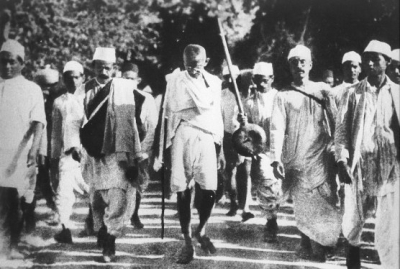
Gandhiji said, “Next to air and water, salt is perhaps the greatest necessity of life”. Under the British Salt Act of 1882, Indians were prohibited from collecting or selling salt. They were forced to buy salt from the British, who charged a heavy salt tax on this basic commodity. This was especially burdensome for the poor.
It is no wonder then that Gandhiji chose breaking the salt tax law as his first priority after the Civil Disobedience Movement was launched.
On March 12, 1930, Gandhiji along with 78 volunteers, set out from Sabarmati Ashram near Ahmedabad for the coastal town of Dandi in Gujarat, many kilometres away. Along the way Gandhiji addressed large crowds and many joined the march to Dandi. After 24 days, on April 5, Gandhiji along with tens of thousands of followers reached their destination. On reaching the sea, Gandhiji picked up a few crystals of salt saying, “With these crystals of salt, I am going to shake the foundations of the British Empire”.
The salt Satyagraha was taken up across the country and millions of people began to make salt in their homes. The police arrested more than 60,000 people in the aftermath.
Motilal Nehru and Jawaharlal were both arrested for their participation. Motilal died shortly after his release from prison in 1931. Jawaharlal Nehru and his family remained at the forefront of the struggle.
The flame of Satyagraha had been lit and the response was overwhelming. India’s freedom struggle began to be followed all over the world. The British soon realized that Gandhiji could neither be suppressed nor ignored and dreaded this new weapon – Satyagraha.
Picture Credit : Google




